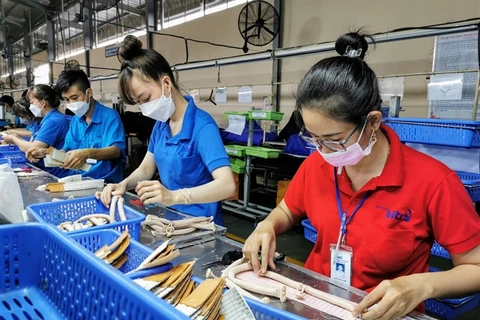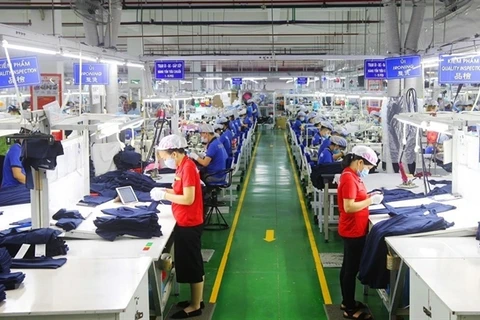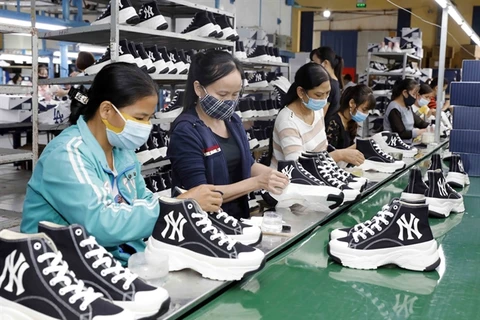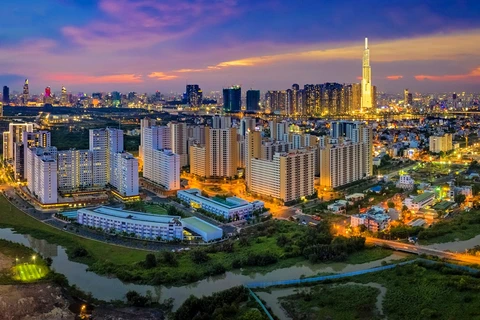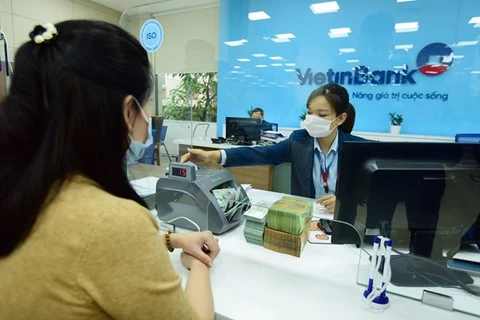Hanoi (VNA) – As the country is taking steps to flexibly adapt to the COVID-19 pandemic and the global political and economic situation, major challenges require the Vietnamese economy to improve its internal strength to adapt to uncertainties and external shocks, heard a recent seminar.
The event was held on March 23 by Radio the Voice of Vietnam and the University of Economics and Business under the Vietnam National University in Hanoi.
Competition in global supply chains
To join supply chains, domestic enterprises need to connect and fairly compete with one another, said Luong Hoang Thai, Director of the Multilateral Trade Policy Department under the Ministry of Industry and Trade.
He explained that competition does not mean confronting with or defeating one another. Rather it means to strive to take the lead in optimising core advantages to create a mutually beneficial cooperation model that matches globalisation.
Nguyen Quang Huan, a National Assembly deputy and Chairman of the Board of Directors at the Halcom Vietnam Joint Stock Company, said self-reliance is the first and foremost prerequisite for Vietnamese enterprises for global integration.
To stay self-reliant, businesses should build core values and seize competitive edge to partner with domestic and international business to access global value and supply chains, he noted.
Pointing out problems with the Vietnamese economy, Nguyen Anh Thu, Vice Rector of the University of Economics and Business, said domestic enterprises haven’t developed strongly. The economy still depends much on the foreign direct investment (FDI) sector in terms of trade and investment, and is facing the risk of falling into the middle-income trap.
Given this, domestic firms should also reform their growth and governance models, she suggested.
Local administrations play supporting role
Thai held that localities and, especially, the Government have a role to play in enhancing the self-reliance of the economy.
Vietnam is a signatory of 17 free trade agreements, and businesses are no longer limited to a market with a population of 100 million. They should improve their competitiveness in the world with access to markets of billions of people. Therefore, the Government will serve as a source of support for private enterprises to develop their reach to major markets, he went on.
Nguyen Tan Tuan, Chairman of the Khanh Hoa provincial People’s Committee, said his province has been working to reinforce self-reliance during the post-pandemic economic recovery process.
In 2020 and 2021, though the local economy contracted considerably, Khanh Hoa still managed to guarantee budget collection, social security, and business operations. Therefore, as soon as the COVID-19 outbreak was brought under control, it made a plan on economic recovery and development.
Khanh Hoa is determined to achieve a growth rate of 7.1% in 2022, Tuan added.
In the first quarter of this year, its economy made an impressive breakthrough as the index of industrial production increased 12% and the gross regional domestic product (GRDP), nearly 5%. Tourism and fishery exports recorded an impressive expansion.
The official said his province has continued to effectively manage financial resources to carry out the Government’s policies, including those on tax reduction and investment support.
Khanh Hoa has ordered its grassroots authorities to swiftly handle investment procedures, address outstanding problems, facilitate sluggish projects, encourage innovation, science and technology, and promote digital transformation. It has also signed agreements with major IT enterprises like FPT, VNPT and Viettel, staying ready to build a digital economy programme and shore up sectors in the post-pandemic period, Tuan told the seminar.
Likewise, localities in Binh Duong province have also been seriously implementing economic development measures, with support policies carried out in a fair and transparent manner, said Vice Chairman of the provincial People’s Committee Nguyen Van Danh.
Hard hit by the pandemic last year, Binh Duong has invested efforts in improving grassroots health care, preventive medicine, and vaccination coverage. It is prioritising infrastructure development and promoting public investment in 2022, he noted.
Danh added the province has also requested departments and sectors to meet business associations and investors to learn about difficulties facing them so as to maximise their access to the Government support policies./.

